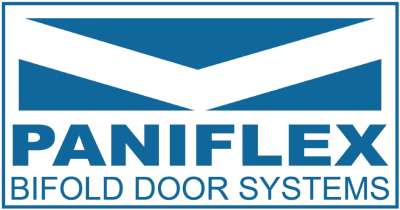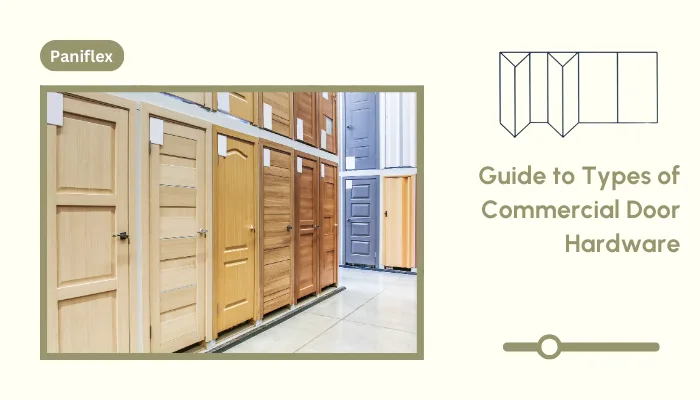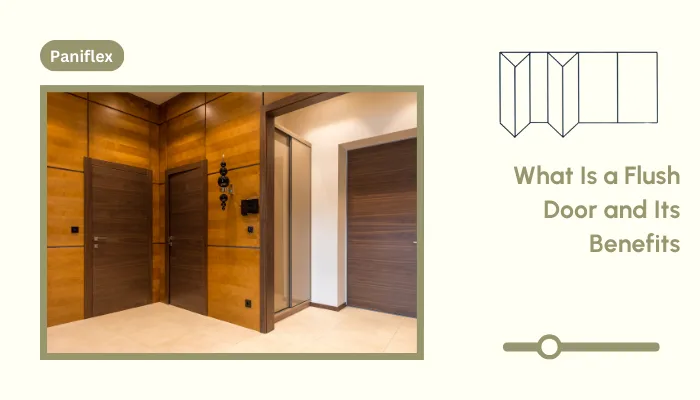Commercial door hardware plays a crucial role in striking a balance between safety, security, and usability in professional spaces. From offices and hospitals to retail stores and educational institutions, the correct hardware ensures both compliance and daily functionality.
We understand that choosing hardware can feel overwhelming when you must account for performance, durability, and strict building codes. We help you through the essential types of commercial door hardware, their applications, and the key factors to consider when specifying them for your projects in this guide.
Ready to experience the benefits of custom closet doors? Explore our range of Paniflex products now.
Quick overview:
- Commercial door hardware includes locks, hinges, closers, exit devices, access systems, and specialty components that ensure safety, durability, and compliance.
- Understanding different hardware types helps architects, designers, and contractors make informed decisions that meet both functional and regulatory needs.
- Key considerations include ADA and fire safety compliance, durability for high-traffic areas, and compatibility with the building’s design.
- Specialty solutions such as fire-rated, acoustic, and automatic hardware address unique safety, accessibility, and performance requirements in commercial projects.
What is Commercial Door Hardware?
Commercial door hardware includes the essential components that allow doors in offices, schools, hospitals, and other facilities to function safely, securely, and efficiently. Unlike residential hardware, it is designed to handle higher traffic and stricter building code requirements.
Characteristics of commercial door hardware:
- Includes locks, hinges, closers, exit devices, and access control systems.
- Ensures compliance with fire, safety, and accessibility standards.
- Available in a variety of finishes to complement commercial design.
Because hardware impacts both safety and usability, selecting the right products is critical. Let us look at why choosing the right commercial door hardware matters for every project.
Suggested Watch: This video demonstrates how to complete a commercial door installation with the necessary hardware to make the door fully functional.
Importance of Choosing the Right Door Hardware
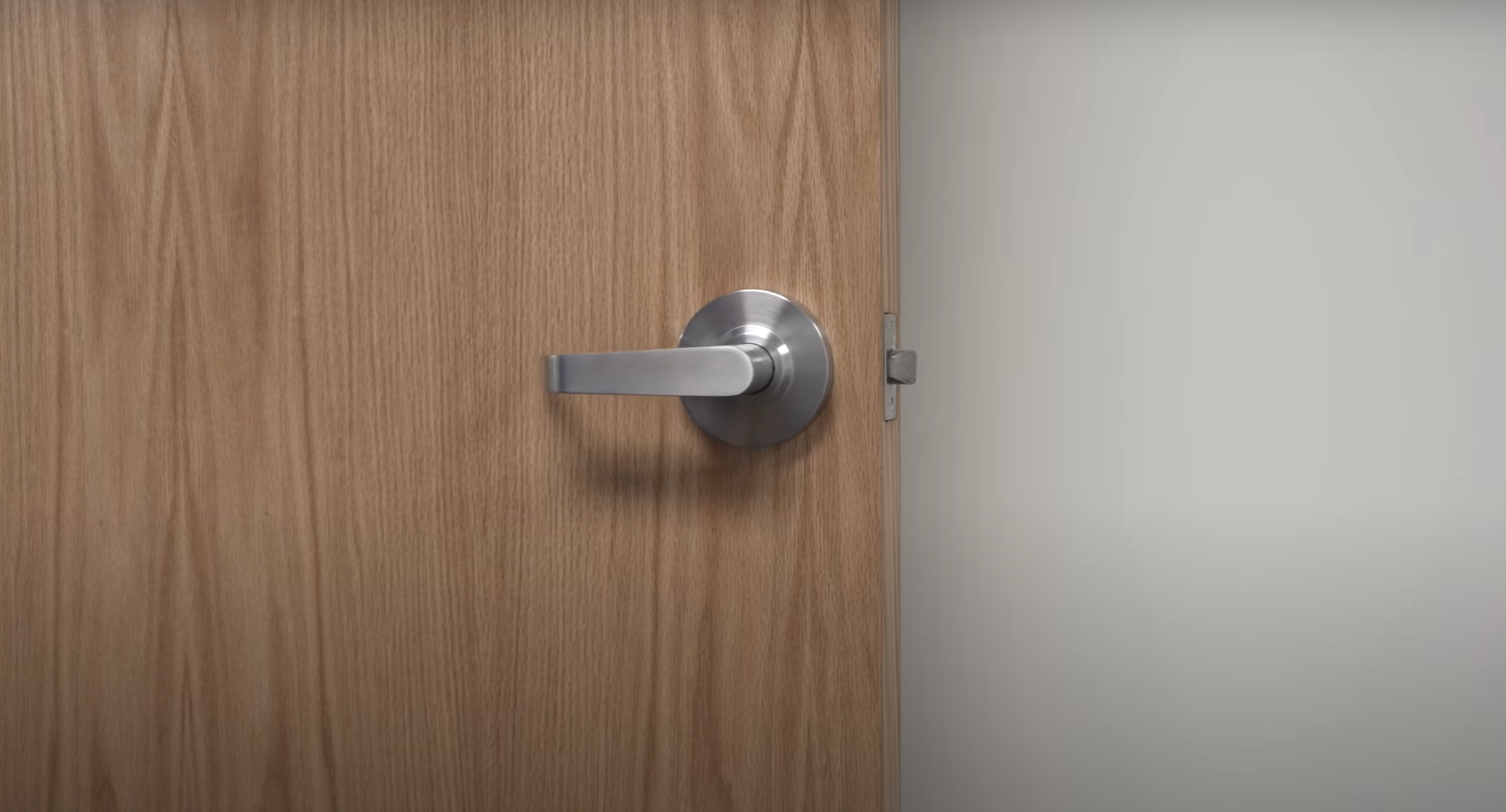
The performance and safety of any commercial space rely heavily on its door hardware. Beyond appearance, the right selection ensures compliance, durability, and user comfort in high-traffic environments.
Need for the right hardware:
- Safety and Security: Proper hardware protects occupants by meeting fire codes, resisting forced entry, and supporting emergency egress.
- Compliance with Regulations: ADA and building code–compliant hardware ensures accessibility and avoids costly legal issues or retrofits later.
- Durability in High-Traffic Areas: Heavy-duty hinges, locks, and closers extend the lifespan of doors in offices, hospitals, and schools.
- Seamless User Experience: Well-chosen hardware improves ease of use, reduces maintenance needs, and enhances overall functionality for occupants.
With its critical role established, it is time to explore the main types of commercial door hardware and how each serves a distinct purpose.
Suggested Read: How to Install Sliding Closet Door Floor Guides on Various Surfaces
Types of Commercial Door Hardware
Every commercial project requires a combination of hardware to balance safety, functionality, and design. Understanding the main categories helps professionals choose the right fit for each application.
Different types of commercial hardware are:
1. Locks and Latches
Locks are the foundation of security in any commercial building, providing controlled access and protection. The type you choose depends on the level of security required.
- Cylindrical locks for standard office or classroom doors.
- Mortise locks for higher security and durability.
- Deadbolts for added reinforcement in restricted areas.
2. Door Closers
Closers ensure doors shut safely and securely after every use, an essential feature in high-traffic and code-regulated spaces. They also improve energy efficiency by keeping doors sealed.
- Surface-mounted closers for general use.
- Concealed closers for a cleaner appearance.
- Adjustable closers to control speed and force.
3. Hinges and Pivots
These components support the constant opening and closing of heavy commercial doors. Their strength directly impacts the lifespan of the door system.
- Heavy-duty hinges for durability.
- Continuous hinges for even weight distribution.
- Pivots for specialized or oversized doors.
4. Exit Devices and Panic Bars
Critical in emergencies, these devices allow for quick and safe egress. They are mandatory in many public and commercial settings.
- Rim exit devices for single doors.
- Vertical rod devices for double doors.
- Panic bars with alarm features for added security.
5. Access Control Systems
Modern buildings often require electronic solutions for secure entry and monitoring. These systems combine convenience with advanced protection.
- Card readers and keypads for secure access control.
- Smart locks are integrated with building security systems.
- Biometric access for high-security environments.
6. Handles and Pulls
Handles not only enhance the design but also ensure ADA compliance and ease of use. The right choice balances form and function.
- Lever handles for ADA accessibility.
- Pull handles for high-traffic doors.
- Custom finishes to match design themes.
While these categories cover the essentials, certain projects require specialized hardware to address unique safety, design, or performance needs. Let us explore some of these specialty solutions.
From the Community: Learn more about the different types of door hinges in this Reddit thread.
Specialty Hardware for Specific Needs
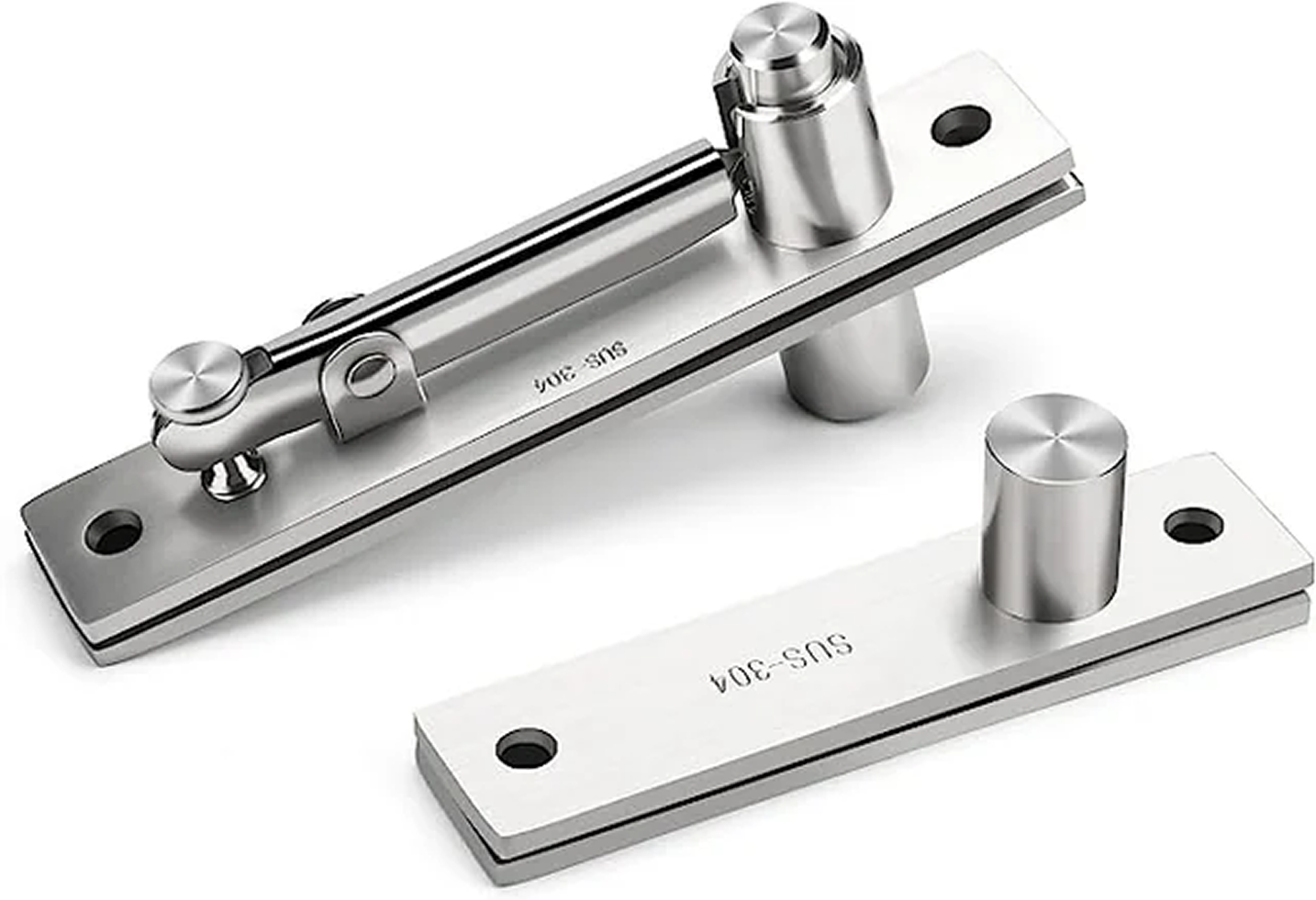
Not all commercial spaces have the same requirements. Some environments call for specialized hardware that enhances safety, efficiency, or functionality beyond standard solutions.
Special types of hardware include:
1. Fire-Rated Door Hardware
In facilities where fire safety is critical, fire-rated hardware ensures compliance with local codes and provides life-saving protection. These components are tested to withstand high heat and maintain door integrity during emergencies.
2. Weatherproofing Hardware
Hospitals, schools, and offices often require noise control and energy efficiency. Acoustic seals and weatherproofing hardware reduce sound transfer, improve insulation, and help maintain consistent indoor temperatures.
3. Automatic Door Operators
Automatic operators are essential in high-traffic areas and buildings that must meet ADA requirements. They provide hands-free access for people of all abilities while improving flow and convenience.
4. High-Security Reinforcement
Banks, labs, and data centers require extra security against forced entry. Reinforced locks, tamper-proof hinges, and advanced access systems help protect sensitive areas from unauthorized access.
To ensure these specialized solutions meet performance and safety expectations, it is important to understand the standards that govern commercial door hardware. Let us look at the key regulations and compliance requirements.
Suggested Read: DIY Ideas for Replacing HVAC and AC Closet Doors
Different Standards for Commercial Hardware
Commercial door hardware must meet specific standards to ensure safety, accessibility, and durability. These guidelines protect building occupants while helping professionals remain compliant with local and national regulations.
Standards to pay attention to:
- ADA ComplianceThe Americans with Disabilities Act (ADA) requires easy-to-operate hardware for individuals with physical limitations. This includes lever handles, push bars, and automatic door operators designed for barrier-free accessibility.
- Fire Safety CodesFire-rated doors and hardware are mandated in many commercial buildings to contain the spread of fire and smoke. These components are tested to withstand high heat for specific timeframes, ensuring safe evacuation routes.
- ANSI/BHMA RatingsThe Builders Hardware Manufacturers Association (BHMA) and American National Standards Institute (ANSI) rate commercial hardware based on durability, security, and performance. Higher grades indicate hardware suited for heavy use and long-term reliability.
- Building and Local CodesThese requirements vary by region and may include additional standards for safety, accessibility, and energy efficiency. Staying informed about local codes helps ensure installations pass inspections and avoid costly retrofits.
With these standards in place, the next step is to identify the features that make commercial hardware not only compliant but also durable and user-friendly. Let’s examine the key features to consider.
Features to Look for in Commercial Door Hardware
Selecting commercial door hardware is not just about meeting building codes. It is about ensuring long-term performance, safety, and ease of use. The right features can significantly impact how a space functions and the frequency of required maintenance.
These are a few features to consider:
- Durability: Hardware should be constructed from high-quality materials to withstand constant use in busy commercial environments without frequent replacement.
- Security: Strong locking mechanisms and tamper-resistant designs provide protection against unauthorized entry, making them essential in offices, schools, and healthcare facilities.
- Accessibility: ADA-compliant handles, automatic operators, and easy-to-grip designs ensure usability for all occupants, including individuals with disabilities.
- Fire Resistance: Fire-rated components help maintain safe evacuation routes and meet mandatory fire safety regulations in commercial buildings.
- Design Compatibility: Hardware should complement the overall design theme of the building while maintaining its functional purpose and code compliance.
With these features in mind, it is equally important to consider practical factors such as cost, traffic levels, and long-term maintenance when selecting hardware. Let us explore these considerations in more detail.
Suggested Read: Installing Sliding Closet Doors Over Carpet
Factors to Consider When Selecting Commercial Hardware
Choosing the right commercial door hardware involves more than appearance. Contractors, architects, and interior designers must weigh practical factors that impact safety, compliance, and long-term performance in their projects.
Factors to consider are:
- Traffic Volume: High-traffic areas like hospitals, schools, and offices require heavy-duty hardware that can endure constant use without frequent repairs.
- Budget and Cost Efficiency: Balancing upfront costs with long-term durability helps avoid frequent replacements and maintenance expenses down the line.
- Maintenance Needs: Some hardware requires regular lubrication or adjustments, while others are designed for low-maintenance performance. Choose based on the client’s ability to maintain it.
Once these factors are clearly understood, the next step is knowing how to apply them effectively. Here are some practical tips to guide the selection of commercial door hardware.
Tips for Commercial Door Hardware Selection
Making the right hardware choices can be challenging when balancing safety, compliance, and looks. Following these tips ensures you select products that meet both functional and regulatory needs.
Tips for selecting the right hardware:
- Prioritize Code Compliance: Always confirm that hardware meets ADA, ANSI/BHMA, and fire safety standards before installation.
- Match to Usage Levels: Choose heavy-duty hardware for high-traffic areas and lighter options for spaces with limited use.
- Security with Accessibility: Opt for solutions that protect against unauthorized entry while remaining easy to use for all occupants.
- Request Product Warranties: Select hardware with strong manufacturer warranties to ensure long-term reliability and peace of mind.
- Consider Future Scalability: Plan for potential upgrades, such as integrating electronic access systems, to keep the building adaptable.
With these strategies in mind, it becomes clear that working with a trusted provider makes all the difference. Custom Door & Mirror offers a range of solutions designed to meet the unique needs of commercial projects.
Door Hardware Solutions from Custom Door & Mirror
At Custom Door & Mirror, we recognize that commercial spaces demand hardware that delivers more than just functionality. Our custom solutions combine durability, compliance, and design flexibility, helping architects, contractors, and interior designers achieve reliable results for every project.
Here’s why you should choose us:
1. Comprehensive Range
We offer a comprehensive range of commercial hardware, including locks, closers, exit devices, and access control systems. Each product is designed to handle heavy use while maintaining design appeal. This ensures that both safety and design goals are met.
2. Code-Compliant Solutions
Our hardware is carefully chosen to comply with ADA standards, fire codes, and ANSI/BHMA ratings. This gives you confidence that every installation will pass inspections while remaining accessible to all users. With us, compliance is never an afterthought.
3. Fit for Unique Spaces
Not all commercial projects have standard dimensions or requirements. We specialize in providing custom-fitted hardware solutions that adapt seamlessly to unique openings and layouts. This tailored approach reduces costly modifications and ensures a precise, professional finish.
4. Support for Large Projects
We regularly work with contractors and developers managing multi-unit or large-scale projects. Our team ensures timely delivery, consistency across all units, and competitive pricing on bulk orders. This allows you to complete projects efficiently without sacrificing quality.
Custom Door & Mirror remains a trusted partner for commercial hardware solutions in Long Island (Nassau & Suffolk County), Queens, Brooklyn, Manhattan, Bronx, Staten Island, New Jersey, and Connecticut. We combine performance with design to meet the diverse needs of modern projects. With a proven track record and a focus on quality, we help professionals deliver lasting results.
Conclusion
Commercial door hardware plays a crucial role in ensuring safety, accessibility, and durability in high-traffic spaces. From locks and exit devices to automatic operators and access control systems, selecting the right hardware is key to meeting both functional needs and compliance standards.
At Custom Door & Mirror, we provide solutions that combine long-lasting durability with ADA and fire code compliance. Our offerings include a wide range of hardware options, precision-fit products for unique spaces, and reliable support for bulk orders and large-scale projects.
Equip your project with hardware that blends safety, performance, and design. Contact Custom Door & Mirror today to discuss personalized solutions and bulk order options for your commercial needs.
Ready to experience the benefits of custom closet doors? Explore our range of Paniflex products now.
Frequently Asked Questions
Q1. What are the different types of commercial door handles?
Commercial door handles include lever handles, pull handles, and push plates. Lever handles are ADA-compliant and widely used, while pull handles suit high-traffic areas. Push plates are often paired with automatic operators for hands-free access in commercial spaces.
Q2. What is the difference between grade 2 and grade 3 door hardware?
Grade 2 hardware is designed for light commercial use, offering moderate durability and security. Grade 3 hardware is primarily residential and not recommended for commercial projects. For high-traffic areas, Grade 1 is the most durable and secure option.
Q3. What is the current trend for door hardware?
Modern trends emphasize minimalist designs, matte black or brushed nickel finishes, and electronic access control systems. Many commercial projects now combine sleek looks with advanced technology, such as card readers, smart locks, and touchless entry systems, for safety and convenience.
Q4. What are the specs for commercial doors?
Commercial doors typically measure 36 inches wide and 80 inches high, with a thickness of 1¾ inches. They often require fire ratings, ADA-compliant hardware, and ANSI/BHMA–graded components to ensure durability, accessibility, and compliance with local building codes.
Q5. How often should commercial door hardware be inspected?
Hardware in high-traffic commercial spaces should be inspected at least twice a year. Regular checks help identify wear on hinges, locks, and closers early, preventing costly repairs and ensuring compliance with safety and accessibility standards.
Q6. Can commercial door hardware be customized for unique projects?
Yes, many suppliers offer custom sizing, finishes, and specialty hardware to fit non-standard openings or specific design themes. Custom options are especially valuable in large-scale projects where consistency and design alignment are key priorities.
